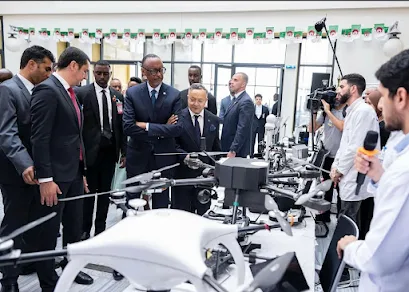Pamoja in Practice: How Rwanda and Algeria Are Building Africa’s AI Future Together.
By Newton Muya – Founder, Pamoja AI
Artificial Intelligence is no longer a distant frontier; it is the reality shaping our economies, health systems, education, and daily lives. While the rest of the world races to harness its power, Africa is showing that progress through partnership is not just possible — it is powerful. A recent visit by President Paul Kagame to Algeria’s National School of Artificial Intelligence (ENSIA) is more than just a diplomatic moment; it is a glimpse into how African unity can unlock a shared, intelligent future.
The Significance of the Visit
President Kagame’s tour of Algeria’s state-of-the-art AI school is a testament to the growing ties between African nations in science and technology. At ENSIA, Rwandan students are already receiving world-class AI training — a clear sign that Algeria is not gatekeeping its knowledge, but sharing it.
This moment symbolizes a bold idea: Africa doesn’t have to wait for external aid or Western tech giants to shape its AI destiny. We can train each other, uplift each other, and grow together.
Pamoja: Unity as a Technology Strategy
In Swahili, Pamoja means “together.” At Pamoja AI, we believe this word should be at the heart of Africa’s digital transformation. The Rwanda–Algeria collaboration is a real-world example of what happens when African countries embrace Pamoja thinking.
Rather than duplicating efforts or competing for limited resources, they are pooling talent, infrastructure, and educational opportunities. This shared vision ensures that AI advancement is not limited to a few countries — it becomes a continental movement.
Why Partnerships Like This Matter
-
Closing the AI Skills Gap
With a massive youth population and growing internet access, Africa has the raw potential to lead in AI. But skills training is essential. By sharing institutions and curricula, African nations can produce thousands of AI engineers, data scientists, and ethical AI policymakers faster than going it alone. -
Reducing Brain Drain
When young Africans can get world-class AI education on the continent, they're more likely to stay, build local startups, and solve African problems with African context. -
Boosting Continental Innovation
Cross-border collaboration enables researchers and developers to tackle continent-wide challenges — from climate resilience to agriculture, health diagnostics, and language translation — using AI solutions built with shared data and diverse insights. -
Creating Policy Harmony
Collaborative education lays the groundwork for collaborative governance. If nations collaborate on training, they’re more likely to develop unified AI standards and ethical frameworks, making it easier for businesses and innovators to scale across borders.
Towards an AI-Powered African Union
Imagine a future where AI hubs in Kigali, Algiers, Lagos, Nairobi, and Accra are connected — not just by fiber optics, but by purpose. Students move across borders to learn. Startups collaborate across regions. Governments co-invest in AI research. This isn’t fiction — it’s the natural next step when African countries choose cooperation over isolation.
Conclusion: The Power of Pamoja
What we’re witnessing with Rwanda and Algeria is more than an academic exchange — it's a declaration of shared destiny. It's a reminder that Africa’s strength in AI will come not from individual ambition, but from collective action.
As Pamoja AI, we believe in this vision of one continent, one future — built together, intelligently.
Let’s keep building.

.jpeg)


Comments
Post a Comment